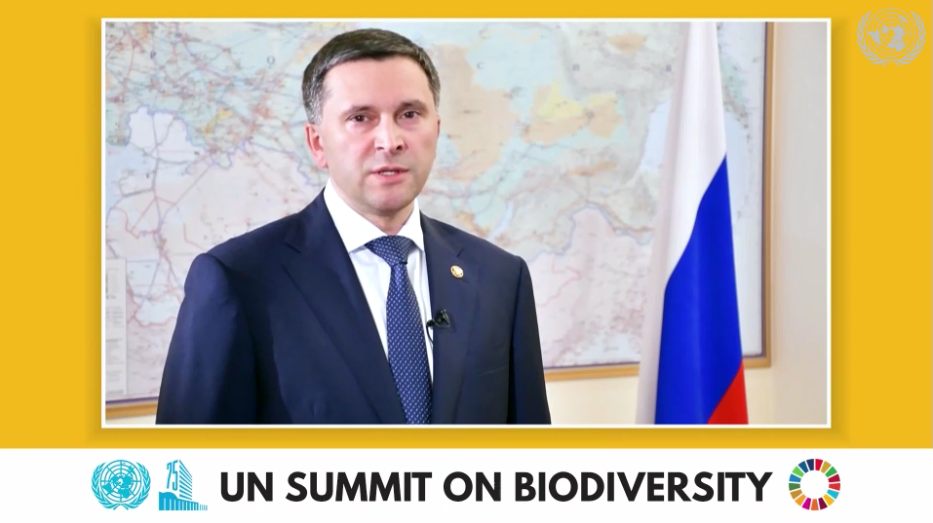Statement by Dmitry Kobylkin, Minister of Natural Resources and Environment of the Russian Federation, at the United Nations Summit on Biodiversity
Mr. President of the General Assembly,
Mr. Secretary-General,
Excellencies,
Dear colleagues,
The Russian Federation attaches great importance to the conservation of biological diversity and ensuring sustainable use of its components. These tasks are the responsibility of not only federal and regional governments but also of the private sector and civil society. It is important to provide for mechanisms to engage businesses in projects aimed at conservation of endangered species, including through public-private partnerships. This vision underpins policies of the Russian Federation in this field.
In order to ensure viability of the biosphere, we need action from all countries taking into account their national circumstances. In the Russian Federation, we put a primary focus on developing and strengthening our system of protected areas along with conservation and restoration of rare and endangered animal and plant species.
Today, the most valuable natural habitats and sites are under conservation within 334 federal protected areas, including 109 nature reserves, 64 national parks and 61 sanctuaries. The system of protected areas as a whole comprises nearly 13,000 federal, regional and local territories with an area of over 255 million hectares or more than 13% of the Russian Federation’s area. If we take into account other forms of territorial protection that, in line with international standards, are also considered protected areas, it means that over 25% of Russia’s land mass is legally protected. This is a substantial contribution of Russia to the achievement of strategic biodiversity targets which imply that at least 17% of land should be protected by 2020. We have set a target to create at least 24 new protected areas of 5 million hectares by 2024. 14 of them worth 4.6 million hectares have already been created. We believe that adopted and planned measures will ensure conservation of ecosystems while simultaneously promoting ecotourism by bringing the number of visitors of natural sites up to 10 million.
This year we have issued a new Red List of the Russian Federation. One thirds of animals included in the list are new species that are now under protection by the government. More than a hundred of species have been taken off the list as their population has grown. This practice has demonstrated that well-planned conservation action leads to positive outcomes – over the recent years, we have been able to increase the numbers of the Siberian tigers, Persian, Amur and snow leopards, polar bears, European bison and falcons.
Preventing flora and fauna from extinction and ensuring the environmental balance require a holistic approach and harmonization of efforts on other ecological and sustainable development tracks. As a “forest power” with 20% of world’s forests, the Russian Federation attaches special significance to sustainable forest management, adaptation to adverse effects of climate change, sustainable development of its freshwater systems in accordance with the basin approach to water management, including in the transboundary context. I would also like to emphasize the role of indigenous peoples – their traditional knowledge and experience in sustainable use of nature are particularly in demand at the local and regional levels.
Finally, conservation and sustainable use of biodiversity are one of the crucial issues of international environmental cooperation that should be done in a non‑discriminatory way and on the basis of the existing international legal architecture and universally recognized scientific data.
The future post-2020 global biodiversity framework should become an effective targeted addition to multilateral environmental instruments, rather than their replacement. Its tools should reflect a common vision of countries as well as modern-day realities and promote the implementation of the 2030 Agenda for Sustainable Development bearing in mind not only environmental but also social and economic aspects, including its main objective of poverty eradication in the world.
The document should respect sovereignty of countries over their natural resources and economic activity and take into account previous experiences and national priorities and specificities.
We should pay attention to the needs of countries in special situations – the least developed countries, landlocked developing countries and small island developing states. It is important to make the language of the global framework draw from unequivocal intergovernmentally-agreed formulations and correspond to the UN practices while ensuring that it is clear for the wider public. This will enable all relevant stakeholders to implement the document in the best possible manner.
In conclusion, I am confident that this Summit will become a significant step towards preparations for the 15th meeting of the Conference of the Parties to the Convention on Biological Diversity.
